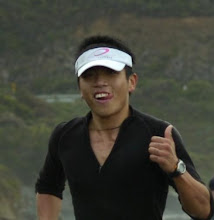Wednesday, June 22, 2005
Composure during a race
The subject of maintaining composure has never been more apt when applied to the realm of adventure racing. As one of the hallmarks of adventure races is the application of navigation and route-finding skills, it stands to reason that the better composed one is, the better he/she is able to apply the required powers of observation and navigation skills during the race, and subsequently the less errors one will be likely to commit in a competitive scenario.
Composure, which is closely intertwined with mental acuity, is a physiological state of being that cannot be ignored when seriously considering improving all-round performance in adventure racing. Other sports can be compared to adventure racing, with relatively different of emphasis on composure for each. To give a brief illustraion: Alpine mountaineering, deep-sea wreck diving, and aerobatic flight probably rate as three of the most likely sports where even the slightest lost of composure can have catastrophic results for the athlete or those around him/her; at the opposite end of the scale are sports like sprinting races, or power-lifting. Suffice to say, it is unfair to overgeneralize and declare that sports of the latter ilk require less 'brain-power' or are 'not a thinking-man's sport'.
In itself, the scope of demands on the racer's composure in adventure racing vary over a very broad spectrum. One classic situation is following brightly-coloured trail markers in broad daylight on a hiking trail carrying little gear and with a clockwork team. The other is navigating through impenetrable bush, carrying a heavy pack and mountain bike, while muddy, sleep-deprived, and calorie-deficient, all the while surrounded by injured/arguing/zoned-out/whining team mates, with driving wind and a freezing rainstorm thrown in for good measure. It is obvious which of the two situations demands better composure and its maintenance.
The symptons of composure deficiency in adventure racing:
- forgetfulness
- 'losing the trail' or worsening of 'trail eyes'
- misinterpreted instructions / directions
- abrupt or illogical tactics
- navigational errors
- impaired interaction with team mates
Taining 'composure fitness' is thus a multi-pronged approach to eliminating the causes behind the aforementioned symptons. To be able to run at a fair clip and still keep track of whereabouts on the map, team mate dispositions, the list of 'to-do' tasks in a mystery test, or a check list of mandatory equipment in an upcoming transition, needs conditioning. If the body is not conditioned to be comfortable at a high level of exertion, especially during critical phases of an adventure race (anticipated or otherwise) which require high levels of composure, an athlete is setting himself and his team up for decreased performance. I will discuss this topc in more detail of course, once i have conducted more self-research (i.e: being my own guinea pig).
Composure, which is closely intertwined with mental acuity, is a physiological state of being that cannot be ignored when seriously considering improving all-round performance in adventure racing. Other sports can be compared to adventure racing, with relatively different of emphasis on composure for each. To give a brief illustraion: Alpine mountaineering, deep-sea wreck diving, and aerobatic flight probably rate as three of the most likely sports where even the slightest lost of composure can have catastrophic results for the athlete or those around him/her; at the opposite end of the scale are sports like sprinting races, or power-lifting. Suffice to say, it is unfair to overgeneralize and declare that sports of the latter ilk require less 'brain-power' or are 'not a thinking-man's sport'.
In itself, the scope of demands on the racer's composure in adventure racing vary over a very broad spectrum. One classic situation is following brightly-coloured trail markers in broad daylight on a hiking trail carrying little gear and with a clockwork team. The other is navigating through impenetrable bush, carrying a heavy pack and mountain bike, while muddy, sleep-deprived, and calorie-deficient, all the while surrounded by injured/arguing/zoned-out/whining team mates, with driving wind and a freezing rainstorm thrown in for good measure. It is obvious which of the two situations demands better composure and its maintenance.
The symptons of composure deficiency in adventure racing:
- forgetfulness
- 'losing the trail' or worsening of 'trail eyes'
- misinterpreted instructions / directions
- abrupt or illogical tactics
- navigational errors
- impaired interaction with team mates
Taining 'composure fitness' is thus a multi-pronged approach to eliminating the causes behind the aforementioned symptons. To be able to run at a fair clip and still keep track of whereabouts on the map, team mate dispositions, the list of 'to-do' tasks in a mystery test, or a check list of mandatory equipment in an upcoming transition, needs conditioning. If the body is not conditioned to be comfortable at a high level of exertion, especially during critical phases of an adventure race (anticipated or otherwise) which require high levels of composure, an athlete is setting himself and his team up for decreased performance. I will discuss this topc in more detail of course, once i have conducted more self-research (i.e: being my own guinea pig).

